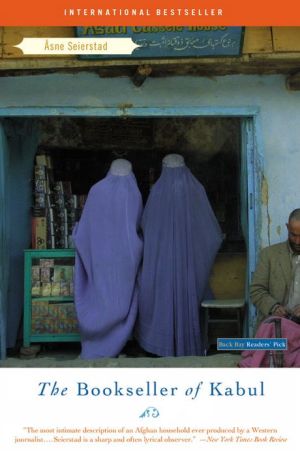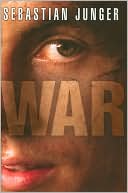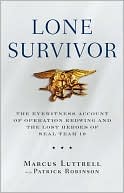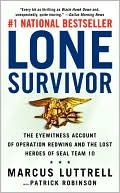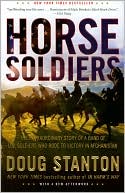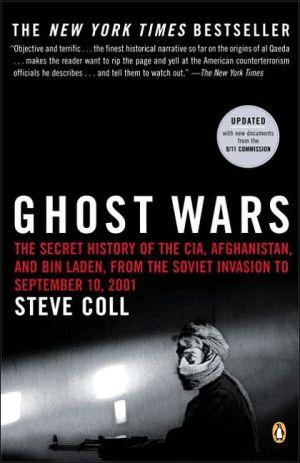Bookseller of Kabul
With The Bookseller of Kabul, award-winning journalist Asne Seierstad has given readers a first-hand look at Afghani life as few outsiders have seen it. Invited to live with Sultan Khan, a bookseller in Kabul, and his family for months, this account of her experience allows the Khans to speak for themselves, giving us a genuinely gripping and moving portrait of a family, and of a country of great cultural riches and extreme contradictions.For more than 20 years, Sultan Khan has defied the...
Search in google:
With The Bookseller of Kabul, award-winning journalist Asne Seierstad has given readers a first-hand look at Afghani life as few outsiders have seen it. Invited to live with Sultan Khan, a bookseller in Kabul, and his family for months, this account of her experience allows the Khans to speak for themselves, giving us a genuinely gripping and moving portrait of a family, and of a country of great cultural riches and extreme contradictions. For more than 20 years, Sultan Khan has defied the authorities—whether Communist or Taliban—to supply books to the people of Kabul. He has been arrested, interrogated, and imprisoned, and has watched illiterate Taliban soldiers burn piles of his books in the street. Yet he had persisted in his passion for books, shedding light in one of the world's darkest places. This is the intimate portrait of a man of principle and of his family—two wives, five children, and many relatives sharing a small four-room house in this war ravaged city. But more than that, it is a rare look at contemporary life under Islam, where even after the Taliban's collapse, the women must submit to arranged marriages, polygamous husbands, and crippling limitations on their ability to travel, learn and communicate with others. About the Author Asne Seierstad is an award-winning journalist who has reported from such war-torn regions as Chechnya, the Balkans, Iraq and Afghanistan. The New York Times Book Review Seierstad is a sharp and often lyrical observer of Afghan domestic life. Even in Ingrid Christophersen's slightly stiff translation, ''The Bookseller of Kabul'' reads like a novel and is absorbing reportage. ....From a strictly literary perspective, ''The Bookseller of Kabul'' is an effective portrait of one rather unhappy Afghan family. It is certainly the most intimate description of an Afghan household ever produced by a Western journalist. — Richard McGill
\ \ The Bookseller of Kabul\ \ \ \ \ By Asne Seierstad\ \ \ Time Warner\ \ \ \ Copyright © 2002\ \ Asne Seierstad\ All right reserved.\ \ \ ISBN: 0-316-73450-0\ \ \ \ \ \ \ Chapter One\ \ \ The Proposal \ \ When Sultan Khan thought the time had come to find himself a new\ wife, no one wanted to help him. First he approached his mother.\ "You will have to make do with the one you have," she said.\ Then he went to his eldest sister. "I'm fond of your first wife,"\ she said. His other sisters replied in the same vein.\ "It's shaming for Sharifa," said his aunt.\ Sultan needed help. A suitor cannot himself ask for a girl's hand.\ It is an Afghan custom that one of the women of the family convey\ the proposal and give the girl the once-over to assure herself that\ she is capable, well brought up, and suitable wife material. But\ none of Sultan's close female relations wanted to have anything to\ do with this offer of marriage.\ Sultan had picked out three young girls he thought might fit the\ bill. They were all healthy and good-looking, and of his own tribe.\ In Sultan's family it was rare to marry outside the clan; it was\ considered prudent and safe to marry relatives, preferably cousins.\ Sultan's first candidate was sixteen-year-old Sonya. Her eyes were\ dark and almond-shaped and her hair shining black. She was shapely,\ voluptuous, and it was said of her that she was a good worker. Her\ family was poor and they were reasonably closely related. Her\ mother's grandmother and Sultan's mother's grandmother were sisters.\ While Sultan ruminated over how to ask for the hand of the chosen\ one without the help of family women, his first wife was blissfully\ ignorant that a mere chit of a girl, born the same year she and\ Sultan were married, was Sultan's constant preoccupation. Sharifa\ was getting old. Like Sultan, she was a few years over fifty. She\ had borne him three sons and a daughter. The time had come for a man\ of Sultan's standing to find a new wife.\ "Do it yourself," his brother said finally.\ After some thought, Sultan realized that this was his only solution,\ and early one morning he made his way to the house of the\ sixteen-year-old. Her parents greeted him with open arms. Sultan was\ considered a generous man and a visit from him was always welcome.\ Sonya's mother boiled water and made tea. They reclined on flat\ cushions in the mud cottage and exchanged pleasantries until Sultan\ thought the time had come to make his proposal.\ "A friend of mine would like to marry Sonya," he told the parents.\ It was not the first time someone had asked for their daughter's\ hand. She was beautiful and diligent, but they thought she was still\ a bit young. Sonya's father was no longer able to work. During a\ brawl a knife had severed some of the nerves in his back. His\ beautiful daughter could be used as a bargaining chip in the\ marriage stakes, and he and his wife were always expecting the next\ bid to be even higher.\ "He is rich," said Sultan. "He's in the same business as I am. He is\ well educated and has three sons. But his wife is starting to grow\ old."\ "What's the state of his teeth?" the parents asked immediately,\ alluding to the friend's age.\ "About like mine," said Sultan. "You be the judge."\ Old, the parents thought. But that was not necessarily a\ disadvantage. The older the man, the higher the price for their\ daughter. A bride's price is calculated according to age, beauty,\ and skill and according to the status of the family.\ When Sultan Khan had delivered his message, the parents said, as\ could be expected, "She is too young."\ Anything else would be to sell short to this rich, unknown suitor\ whom Sultan recommended so warmly. It would not do to appear too\ eager. But they knew Sultan would return; Sonya was young and\ beautiful.\ He returned the next day and repeated the proposal. The same\ conversation, the same answers. But this time he got to meet Sonya,\ whom he had not seen since she was a young girl.\ She kissed his hand, in the custom of showing respect for an elder\ relative, and he blessed the top of her head with a kiss. Sonya was\ aware of the charged atmosphere and flinched under Uncle Sultan's\ searching look.\ "I have found you a rich man, what do you think of that?" he asked.\ Sonya looked down at the floor. A young girl has no right to have an\ opinion about a suitor.\ Sultan returned the third day, and this time he made known the\ suitor's proposition: a ring, a necklace, earrings, and bracelet,\ all in red gold; as many clothes as she wanted; 600 pounds of rice,\ 300 pounds of cooking oil, a cow, a few sheep, and 15 million\ afghani, approximately $500.\ Sonya's father was more than satisfied with the price and asked to\ meet this mysterious man who was prepared to pay so much for his\ daughter. According to Sultan, he even belonged to their tribe, in\ spite of their not being able to place him or remember that they had\ ever met him.\ "Tomorrow," said Sultan, "I will show you a picture of him."\ The next day, fortified by a sweetener, Sultan's aunt agreed to\ reveal to Sonya's parents the identity of the suitor. She took a\ photograph with her-a picture of Sultan Khan himself-and with it the\ uncompromising message that they had no more than an hour to make up\ their minds. If the answer was yes, he would be very grateful, and\ if it was no, there would be no bad blood between them. What he\ wanted to avoid at all costs was everlasting bargaining about maybe,\ maybe not.\ The parents agreed within the hour. They were keen on Sultan Khan,\ his money, and his position. Sonya sat in the attic and waited. When\ the mystery surrounding the suitor had been solved and the parents\ had decided to accept, her father's brother came up to the attic.\ "Uncle Sultan is your wooer," he said. "Do you consent?"\ Not a sound escaped Sonya's lips. With tearful eyes and bowed head,\ she hid behind her long shawl.\ "Your parents have accepted the suitor," her uncle said. "Now is\ your only chance to express an opinion."\ She was petrified, paralyzed by fear. She did not want the man but\ she knew she had to obey her parents. As Sultan's wife, her standing\ in Afghan society would go up considerably. The bride money would\ solve many of her family's problems. The money would help her\ parents buy good wives for their sons.\ Sonya held her tongue, and with that her fate was sealed. To say\ nothing means to give one's consent. The agreement was drawn up, the\ date fixed.\ Sultan went home to inform his family of the news. His wife,\ Sharifa, his mother, and his sisters were seated around a dish of\ rice and spinach. Sharifa thought he was joking and laughed and\ cracked some jokes in return. His mother too laughed at Sultan's\ joke. She could not believe that he had entered into a proposal of\ marriage without her blessing. The sisters were dumbfounded.\ No one believed him, not until he showed them the kerchief and\ sweetmeats the parents of a bride give the suitor as proof of the\ engagement.\ Sharifa cried for twenty days. "What have I done? What a disgrace.\ Why are you dissatisfied with me?"\ Sultan told her to pull herself together. No one in the family\ backed him up, not even his own sons. Nevertheless, no one dared\ speak out against him-he always got his own way.\ Sharifa was inconsolable. What really rankled was the fact that the\ man had picked an illiterate, someone who had not even completed\ nursery school. She, Sharifa, was a qualified Persian language\ teacher. "What has she got that I haven't got?" she sobbed.\ Sultan rose above his wife's tears.\ No one wanted to attend the engagement party. But Sharifa had to\ bite the bullet and dress up for the celebrations.\ "I want everyone to see that you agree and support me. In the future\ we will all be living under the same roof and you must show that\ Sonya is welcome," he demanded. Sharifa had always humored her\ husband, and now too, in this worst circumstance, giving him to\ someone else, she knuckled under. He even demanded that Sharifa\ should put the rings on his and Sonya's fingers.\ Twenty days after the proposal of marriage the solemn engagement\ ritual took place. Sharifa pulled herself together and put on a\ brave face. Her female relatives did their best to unsettle her.\ "How awful for you," they said. "How badly he has treated you. You\ must be suffering."\ The wedding took place two months after the engagement, on the day\ of the Muslim New Year's Eve. This time Sharifa refused to attend.\ "I can't," she told her husband.\ The female family members backed her up. No one bought new dresses\ or applied the normal amount of makeup required at wedding\ ceremonies. They wore simple coiffures and stiff smiles-in deference\ to the superannuated wife who would no longer share Sultan Khan's\ bed. It was now reserved for the young, terrified bride-but they\ would all be under the same roof, until death did them part.\ (Continues...)\ \ \ \ \ \ Excerpted from The Bookseller of Kabul\ by Asne Seierstad\ Copyright © 2002 by Asne Seierstad.\ Excerpted by permission.\ All rights reserved. No part of this excerpt may be reproduced or reprinted without permission in writing from the publisher.\ Excerpts are provided by Dial-A-Book Inc. solely for the personal use of visitors to this web site.\ \ \
ForewordixThe Proposal3Burning Books9Crime and Punishment23Suicide and Song37The Business Trip41Do You Want to Make Me Sad?67No Admission to Heaven80Billowing, Fluttering, Winding84A Third-Rate Wedding94The Matriarch106Temptations122The Call from Ali131The Smell of Dust163An Attempt181Can God Die?194The Dreary Room204The Carpenter214My Mother Osama245A Broken Heart267Epilogue285
\ Richard McGill MurphyThe most intimate description of an Afghan household ever produced by a Western journalist. . . . Seierstad is a sharp and often lyrical observer.\ — New York Times Book Review\ \ \ \ \ Mark HertsgaardAn admirable, revealing portrait of daily life in a country that Washington claims to have liberated but does not begin to understand. Seierstad writes of individuals, but her message is larger.\ — Washington Post Book World\ \ \ Scott W. HelmanA compelling portrait of a country at a crossroads - desperate for tranquillity, factionalized beyond imagination, struggling both to uphold tradition and to modernize, hoping to prove to itself and the rest of the world that it knows peace and stability.\ — Boston Globe\ \ \ \ \ S. L. AllenAn unusually intimate glimpse of a traditional Afghan family. . . . Seierstad imbues a grim story with language of desolate beauty.\ — Entertainment Weekly\ \ \ \ \ Steve WeinbergA compelling book. . . . Seierstad infiltrated a world most readers will never see.\ — Denver Post\ \ \ \ \ The New York Times Book ReviewSeierstad is a sharp and often lyrical observer of Afghan domestic life. Even in Ingrid Christophersen's slightly stiff translation, ''The Bookseller of Kabul'' reads like a novel and is absorbing reportage.\ ....From a strictly literary perspective, ''The Bookseller of Kabul'' is an effective portrait of one rather unhappy Afghan family. It is certainly the most intimate description of an Afghan household ever produced by a Western journalist. — Richard McGill\ \ \ \ \ \ The Washington Post… [Seierstad's] closely observed, affecting account of the family's daily life, and especially of the virtual slavery its females endure, suggests that change will come slowly if at all to Afghanistan … Seierstad writes of individuals, but her message is larger, and no one who reads it will be sanguine about transforming this very traditional culture into a modern democracy anytime soon. — Mark Hertsgaard\ \ \ \ \ Publishers WeeklyAfter living for three months with the Kabul bookseller Sultan Khan in the spring of 2002, Norwegian journalist Seierstad penned this astounding portrait of a nation recovering from war, undergoing political flux and mired in misogyny and poverty. As a Westerner, she has the privilege of traveling between the worlds of men and women, and though the book is ostensibly a portrait of Khan, its real strength is the intimacy and brutal honesty with which it portrays the lives of Afghani living under fundamentalist Islam. Seierstad also expertly outlines Sultan's fight to preserve whatever he can of the literary life of the capital during its numerous decades of warfare (he stashed some 10,000 books in attics around town). Seierstad, though only 31, is a veteran war reporter and a skilled observer; as she hides behind her burqa, the men in the Sultan's family become so comfortable with her presence that she accompanies one of Sultan's sons on a religious pilgrimage and witnesses another buy sex from a beggar girl-then offer her to his brother. This is only one of many equally shocking stories Seierstad uncovers. In another, an adulteress is suffocated by her three brothers as ordered by their mother. Seierstad's visceral account is equally seductive and repulsive and resembles the work of Martha Gellhorn. An international bestseller, it will likely stand as one of the best books of reportage of Afghan life after the fall of the Taliban. (Oct. 29) Copyright 2003 Reed Business Information.\ \ \ \ \ Library JournalSultan Khan, the title's bookseller, and his extended family are comparatively well educated and well off, yet their experiences exemplify the difficulties of effecting change in post-Taliban Kabul. Norwegian journalist Seirestad lived with the Khan family for several months in the spring of 2002, accompanying family members to work, school, shops, weddings, and more. Sultan's business trip to Pakistan, son Mansur's religious pilgrimage, and nephew Tajmir's work as a translator give her opportunities to comment on postwar life beyond Kabul. For more than 30 years, Khan risked arrest by selling books and other printed materials. Yet at home, in a cramped, war-battered apartment shared by mother, siblings, wives, children, and nephews, Sultan is a tyrant. With the exception of Sultan's mother, women in the Khan family have especially grim prospects: the birth of a daughter is considered a tragedy, and marriage, always arranged, confers status but often means trading one form of drudgery for another. Seirestad presents a vivid, intimate, yet frustrating picture of family life after the Taliban. Her book has been translated into 14 languages and is sure to be of interest to general readers here who are curious about life in Afghanistan. Recommended for public libraries.-Lucille M. Boone, San Jose P.L., CA Copyright 2003 Reed Business Information.\ \ \ \ \ School Library JournalAdult/High School-A female journalist from Norway moved in with the Khan family in Afghanistan after the fall of the Taliban. Disguised as she was behind the bulky, shapeless burka and escorted always by a man and even in Western dress, she was somehow anonymous and accepted readily into the bookseller's large extended family. Her account is of the tragedy, contradictions, rivalries, and daily frustrations of a middle-class Afghan family. She accompanied the women as they shopped and dressed for a wedding and was privy to the negotiations for the marriage. She tells of the death by suffocation of a young woman who met her lover in secret, the bored meanderings of a 12-year-old boy forced to work 12-hour days selling candy in a hotel lobby, and of going on a religious pilgrimage with a restless, frustrated teen. All this is recounted with journalistic objectivity in spite of her close ties to the Khans. Events that the author doesn't actually witness or participate in, she recounts from conversations with members of the family, primarily Sultan Khan's sister. There is much irony here-Sultan, who has risked his life to protect and disseminate books with diverse points of view, denies his sons the right to pursue an education and subjects his female relatives to drudgery and humiliation.-Jackie Gropman, Chantilly Regional Library, VA Copyright 2004 Reed Business Information.\ \ \ \ \ Kirkus ReviewsNorwegian journalist Seierstad casts light on the difficult, sometimes dreary, often (still) dangerous life of a bookseller in the Afghan capital, not neglecting the equal but very different tribulations of the women in his family. While covering the Northern Alliance's push south into Kabul after routing the Taliban, the author made the acquaintance of Sultan Khan, a bookseller who had been thrown into jail under both the communist and Taliban regimes. When it comes to literature, Sultan is "a freethinker . . . of the opinion that everyone had the right to be heard," and he paid the price for his beliefs. On the home front, however, he's an ingrained patriarch. It's easy to both admire and to loathe this complex character. On the one hand, Sultan puts himself in harm's way to save a few bits of Afghan heritage and to fight against Afghanistan's more obtuse traditions: "All we know is how to scream, pray and fight," he declares. "We search blindly for a holy man, and find a lot of hot air." But he is also hidebound by notions of honor and his repressive attitude toward women—not just repressive from a Western perspective, Seierstad points out, but stifling to the women's own aspirations, which she portrays with a grim vividness. Taking advantage of her position as a European reporter who can spend time with both men and women, Seierstad moves uneasily between their two worlds, and this tension gives her account its air of otherworldly reality. Quail fights alternate with henna nights, the law of warlords gives way to a day at the bath house, and we see a fundamental clash in Sultan's house between the dreams of women and those of men. A slice of Afghanistan today, rendered with atalent for fine, sobering prose and strange, unnerving settings that recall Ryszard Kapuscinski.\ \
